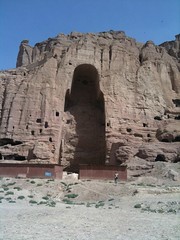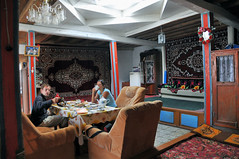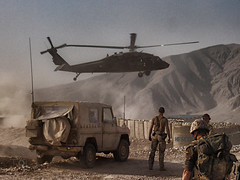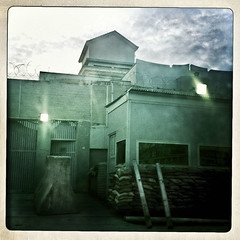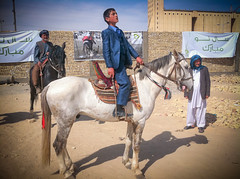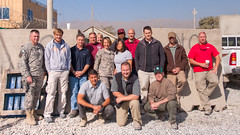 Afghanistan
Afghanistan
Afghanistan, officially the Islamic Emirate of Afghanistan, is a landlocked country located at the crossroads of Central Asia and South Asia. Referred to as the Heart of Asia, it is bordered by Pakistan to the east and south, Iran to the west, Turkmenistan to the northwest, Uzbekistan to the north, Tajikistan to the northeast, and China to the northeast and east. Occupying of land, the country is predominantly mountainous with plains in the north and the southwest, which are separated by the Hindu Kush mountain range. Kabul is the country's largest city and serves as its capital. , Afghanistan's population is 40.2 million (officially estimated to be 32.9 million), composed of ethnic Pashtuns, Tajiks, Hazaras, Uzbeks, Turkmens, Qizilbash, Aimak, Pashayi, Baloch, Pamiris, Nuristanis, and others.
Human habitation in Afghanistan dates back to the Middle Paleolithic era, and the country's strategic location along the historic Silk Road has led it to being described, picturesquely, as the ‘roundabout of the ancient world’. Popularly referred to as the graveyard of empires, the land has historically been home to various peoples and has witnessed numerous military campaigns, including those by the Persians, Alexander the Great, the Maurya Empire, Arab Muslims, the Mongols, the British, the Soviet Union, and most recently by a US-led coalition. Afghanistan also served as the source from which the Greco-Bactrians and the Mughals, amongst others, rose to form major empires. The various conquests and periods in both the Iranian and Indian cultural spheres made the area a center for Zoroastrianism, Buddhism, Hinduism, and later Islam throughout history.
The modern state of Afghanistan began with the Durrani dynasty in the 18th century, with the Durrani Afghan Empire being formed by Ahmad Shah Durrani. The Durrani Empire led conquests in which, at its peak, encompassed land that spanned from eastern Iran to northern India. However, Dost Mohammad Khan is generally considered to be the founder of the first modern Afghan state. Following the Durrani Empire's decline and the death of Ahmad Shah Durrani and Timur Shah, it was divided into multiple smaller independent kingdoms, including but not limited to Herat, Kandahar and Kabul. Afghanistan would be reunited in the 19th century after seven decades of civil war from 1793 to 1863, with wars of unification led by Dost Mohammad Khan from 1823 to 1863, where he conquered the independent principalities of Afghanistan under the Emirate of Kabul. Dost Mohammad died in 1863, days after his last campaign to unite Afghanistan, and Afghanistan was consequently thrown back into civil war with fighting amongst his successors. During this time, Afghanistan became a buffer state in the Great Game between the British Empire (in British-ruled India) and the Russian Empire. From India, the British attempted to subjugate Afghanistan but were repelled in the First Anglo-Afghan War. However, the Second Anglo-Afghan War saw a British victory and the successful establishment of British political influence over Afghanistan. Following the Third Anglo-Afghan War in 1919, Afghanistan became free of foreign political hegemony, and emerged as the independent Kingdom of Afghanistan in June 1926 under Amanullah Khan. This monarchy lasted almost half a century, until Zahir Shah was overthrown in 1973, following which the Republic of Afghanistan was established.
Since the late 1970s, Afghanistan's history has been dominated by extensive warfare, including coups, invasions, insurgencies, and civil wars. The conflict began in 1978 when a communist revolution established a socialist state, and subsequent infighting prompted the Soviet Union to invade Afghanistan in 1979. Mujahideen fought against the Soviets in the Soviet–Afghan War and continued fighting amongst themselves following the Soviets' withdrawal in 1989. The Islamic fundamentalist Taliban controlled most of the country by 1996, but their Islamic Emirate of Afghanistan received little international recognition before its overthrow in the 2001 US invasion of Afghanistan. The Taliban returned to power in 2021 after capturing Kabul and overthrowing the government of the Islamic Republic of Afghanistan, thus bringing an end to the 2001–2021 war. Although initially claiming it would form an inclusive government for the country, in September 2021 the Taliban re-established the Islamic Emirate of Afghanistan with an interim government made up entirely of Taliban members. The Taliban government remains internationally unrecognized.
Afghanistan is rich in natural resources, including lithium, iron, zinc, and copper. It is also the world's largest producer of opium, second largest producer of cannabis, and third largest of both saffron and cashmere. The country is a member of the South Asian Association for Regional Cooperation and a founding member of the Organization of Islamic Cooperation. Due to the effects of war in recent decades, the country has dealt with high levels of terrorism, poverty, and child malnutrition. Afghanistan's economy is the world's 96th-largest, with a gross domestic product (GDP) of $72.9 billion by purchasing power parity. However, Afghanistan remains among the world's least developed countries, ranking 180th in the Human development Index, while its per capita GDP (PPP) ranks 169th out of 186 countries .
Etymology
Some scholars suggest that the root name ''Afghān'' is derived from the Sanskrit word Aśvakan, which was the name used for ancient inhabitants of the Hindu Kush.
Aśvakan literally means "horsemen", "horse breeders", or "cavalrymen" (from aśva, the Sanskrit and Avestan words for "horse"). However, others such as Ibrahim Khan have contended that the word Afghan comes from Bactrian.
Historically, the ethnonym Afghān was used to refer to ethnic Pashtuns. The Arabic and Persian form of the name, Afġān, was first attested in the 10th-century geography book Hudud al-'Alam. The last part of the name, "-stan", is a Persian suffix meaning "place of". Therefore, "Afghanistan" translates to "land of the Afghans", or "land of the Pashtuns" in a historical sense. According to the third edition of the Encyclopedia of Islam:
The term "Afghanistan" first appeared in 1855, during the reign of Dost Mohammad Khan.
Ancient history
Many empires and kingdoms have also risen to power in Afghanistan, such as the Greco-Bactrians, Indo-Scythians, Kushans, Kidarites, Hephthalites, Alkhons, Nezaks, Zunbils, Turk Shahis, Hindu Shahis, Lawiks, Saffarids, Samanids, Ghaznavids, Ghurids, Khaljis, Kartids, Lodis, Surs, Mughals, and finally, the Hotak and Durrani dynasties, which marked the political origins of the modern state. Throughout millennia several cities within the modern day Afghanistan served as capitals of various empires, namely, Bactra (Balkh), Alexandria on the Oxus (Ai-Khanoum), Kapisi, Sigal, Kabul, Kunduz, Zaranj, Firozkoh, Herat, Ghazna (Ghazni), Binban (Bamyan), and Kandahar.
The country has been home to various peoples through the ages, among them the ancient Iranian peoples who established the dominant role of Indo-Iranian languages in the region. At multiple points, the land has been incorporated within vast regional empires; among them the Achaemenid Empire, the Macedonian Empire, the Maurya Empire, and the Islamic Empire. For its success in resisting foreign occupation during the 19th and 20th centuries, Afghanistan has been called the "graveyard of empires", though it is unknown who coined the phrase.
Prehistory and antiquity
Excavations of prehistoric sites suggest that humans were living in what is now Afghanistan at least 50,000 years ago, and that farming communities in the area were among the earliest in the world. An important site of early historical activities, many believe that Afghanistan compares to Egypt in terms of the historical value of its archaeological sites.
Ancient era
Archaeological exploration done in the 20th century suggests that the geographical area of Afghanistan has been closely connected by culture and trade with its neighbors to the east, west, and north. Artifacts typical of the Paleolithic, Mesolithic, Neolithic, Bronze, and Iron Ages have been found in Afghanistan. Urban civilization is believed to have begun as early as 3000 BCE, and the early city of Mundigak (near Kandahar in the south of the country) was a center of the Helmand culture. More recent findings established that the Indus Valley Civilization stretched up towards modern-day Afghanistan, making the ancient civilization today part of Pakistan, Afghanistan, and India. In …








